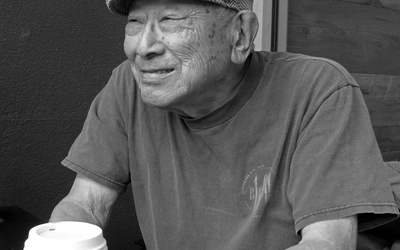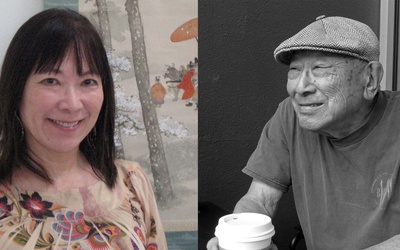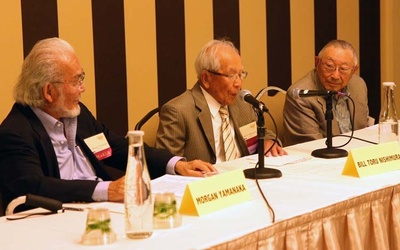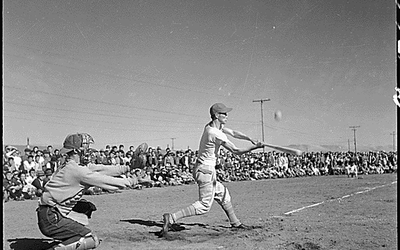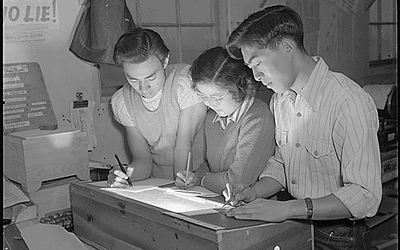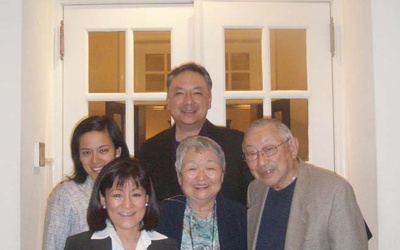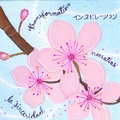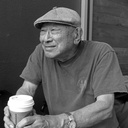
Hiroshi Kashiwagi
Nacido en Sacramento en 1922, el escritor y actor Hiroshi Kashiwagi pasó sus primeros años en Loomis, California. Estuvo encarcelado en el Centro de Segregación de Tule Lake durante la Segunda Guerra Mundial, donde fue definido como “desleal” por negarse a responder las preguntas sobre lealtad. Renunció a su ciudadanía estadounidense y luego trabajó con el Comité de Defensa de Tule Lake y Wayne M. Collins para restaurar su ciudadanía. Desde 1975 viene hablando públicamente de su experiencia encarcelada. Su poema “Un encuentro en el lago Tule”, escrito durante una peregrinación en abril de 1975, lo estableció como una voz fundamental entre los sobrevivientes de los campos de concentración nikkei.
Obtuvo su licenciatura en Lenguas Orientales en UCLA en 1952, seguida de una MLS en UC Berkeley en 1966. Kashiwagi ha trabajado como editor, traductor, intérprete y secretario de idioma inglés en la sede de las Iglesias Budistas de América; también se ha desempeñado como bibliotecario de referencia en la Biblioteca Pública de San Francisco con especialidad en literatura e idiomas. Sus publicaciones incluyen Swimming in the American: A Memoir and Selected Writings , ganadora del American Book Award, 2005; Juegos de caja de zapatos ; Playa del océano: poemas ; y A partir de Loomis y otras historias . Sus créditos actorales notables incluyen la obra The Wash , producida en el Eureka Theatre de San Francisco, y las películas Hito Hata: Raise the Banner (1980, dir. Robert Nakamura), Black Rain (1989, dir. Ridley Scott), Rabbit in the Moon (1999, dir. Emiko Omori) e Infinity and Chashu Ramen (2013, dir. Kerwin Berk).
Falleció en octubre de 2019 a los 96 años.
Actualizado en diciembre de 2019.
(Foto del autor por Ben Arikawa)
Historias de Este Autor
En homenaje a Hiroshi Kashiwagi
19 de diciembre de 2019 • Hiroshi Kashiwagi , traci kato-kiriyama
A medida que nos acercamos al 4 de diciembre y al tercer aniversario de Nikkei Uncovered: una columna de poesía , parecía muy apropiado rendir homenaje al poeta recientemente fallecido, Hiroshi Kashiwagi. Hiroshi, un querido miembro de la comunidad y escritor durante muchas generaciones, fue el poeta inaugural presentado (junto a Amy Uyematsu) cuando comenzamos la columna. Tengo buenos recuerdos de escuchar al Sr. Kashiwagi leer su poesía en voz alta y siempre me inspiró su franqueza, su sonrisa ligeramente …
Ubicación
15 de diciembre de 2016 • Amy Uyematsu , Hiroshi Kashiwagi , traci kato-kiriyama
Para la publicación inaugural de la columna, queríamos comenzar con el tema del lugar, la ubicación y la comunidad y destacar a dos poetas veteranos: Hiroshi Kashiwagi, poeta nisei radicado en San Francisco desde 1962, y Amy Uyematsu, poeta sansei y angelina nativa. Estamos entusiasmados de comenzar con dos escritores que dedican gran parte de su enfoque creativo y su sustento a la poesía y que han influido en muchas personas. Saludos por lo que descubre su poesía... —traci kato-kiriyama …
My Opposition to the Registration
17 de septiembre de 2013 • Hiroshi Kashiwagi
Background I will begin with a brief background of my life before camp as I feel it has some bearing on my reaction to the loyalty questionnaire or the so-called “Registration” order. My parents being aliens, foreigners, and outsiders, I remember that our life was quite marginalized. For example, my father’s store at the far end of town was always referred to as the “Jap store” by the people in town. Growing up, I constantly heard my father use the term …
Tule Lake - Part 2 of 2
16 de julio de 2013 • Hiroshi Kashiwagi
Read Part 1 >>I was having the time of my life, working a few hours a day as a dishwasher in the mess hall and devoting the rest of my time to what I loved—acting, reading, writing, and meeting people with similar interests. Camp life was great. But it all came to an abrupt end in February 1943 with the so-called “loyalty registration,” which was a joint order by the Army and the WRA to facilitate the Army in recruiting …
Tule Lake - Part 1 of 2
9 de julio de 2013 • Hiroshi Kashiwagi
When we arrived at Tule Lake in the morning, we were greeted by a man who claimed to be our Block Manager. It was nice to have someone welcome us on our arrival at this desolate place near the northern border of California. “If you need anything just ask me,” he said. He provided us with mattresses and Army blankets; we unpacked and settled in. After the miserable experience in Arboga, we were excited about the flush toilets in the …
Free Streets
1 de julio de 2013 • Hiroshi Kashiwagi
It was in March of 1946, the morning after my brother, sister, and I came out of camp. We had been given $25 each and a free ride on the train. The train seemed better than the old milk train with the shade drawn that took us to Tule Lake in 1942. After being held until almost the closing of camp, we were finally released. I guess we were used to being confined, but camp was nearly deserted. We were …
A Trip to Cedarville
17 de junio de 2013 • Hiroshi Kashiwagi
It was near the closing of camp, when restrictions were being relaxed a bit, that I heard from our neighbor George about Mr. Crane, the Camp Reports Officer, taking a small group to entertain some high school students at Cedarville. Cedarville is in Modoc County, about 120 miles from Tule Lake. George and a few of his musician friends were going and he asked me if I would be interested in joining them. My first thought was “I don’t sing …
Radio Station KOBY in Medford, Oregon
30 de mayo de 2013 • Hiroshi Kashiwagi
Daytime we could get only two radio stations—small town stations in Medford and Klamath Falls, Oregon that played incessantly. the women dug the lakebedand turned up seashellslong dormant in the sandsorted and cleanedpainted and shellackedthey became ornamental thingstrinkets and necklacesmade in captivity this is Radio Station KOBY in Medford, Oregon we took pieces of 2 x 4whittled and carved themmine were unremarkablebut old Yoshimoto-sanalways did womena shelf lined with themsevere and woodboundmore Egyptian than Japaneseall frontal and nude this is …
The Block Manager’s Canary
23 de mayo de 2013 • Hiroshi Kashiwagi
I knew three block managers in camp—actually, four, as I was one myself. Though I don’t consider myself a regular block manager, since I served only a few months toward the end of camp when there was little administrative work. But recently a former resident of my block unnerved me by announcing to one and all, “He was our Block Manager!” I didn’t know how to take that. A block manager was indeed an important functionary in the block. He …
A Visit to The White House
18 de junio de 2011 • Hiroshi Kashiwagi
It was a windfall event, unexpected and surreal, especially the jaw-dropping reaction of the people. “You mean The White House?” “Yes.” “You’re kidding me?” “No.” And we showed the invitation from The President and Mrs. Obama to An Evening of Poetry at The White House on Wednesday, May 11, 2011 at six thirty o’clock. On Monday evening we were met at the airport by Dr. Raymond Murakami, a prominent dentist to Washington, D.C. power brokers, politicians, and celebrities such as …

